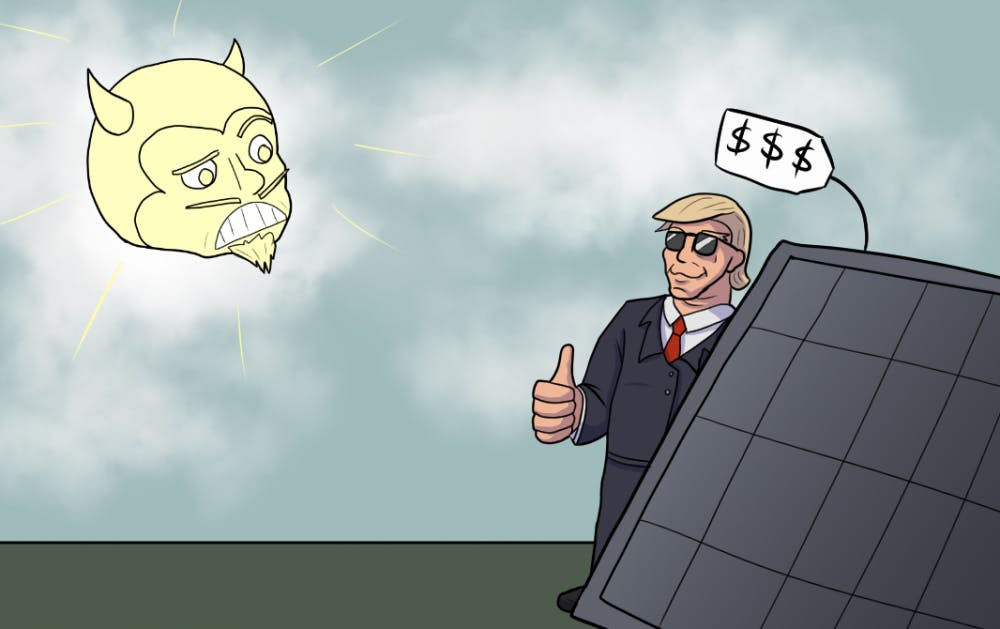The Trump Administration’s tariff on imported solar panels and proposed cuts to the Department of Energy will stifle solar research at ASU and the solar industry at large, solar advocates and academics say.
In January, President Donald Trump imposed a 30 percent tariff on imported solar panels. The U.S. International Trade Commission recommended the tariff because it considered imported solar panels a threat to American solar manufacturing, according to a fact sheet by the Office of the U.S. Trade Representative.
President Donald Trump said the tariff, which will last four years and decrease by five percent each year, was imposed in order to bring more jobs to the domestic solar industry by staving off cheap imported solar cells, mainly from China.
Future solar installation at ASU, which uses panels to power many of its buildings, may be impacted by the tariff, according to Gerald DaRosa, the energy innovation director at ASU.
"It may impact us but it won't stop us," DaRosa said. "That being said, it will make it a little bit more difficult or a little bit more costly for us to increase our solar portfolio."
Although the tariff is meant to increase domestic solar panel manufacturing, the American solar power industry is driven by construction, installation and trade rather than production.
Harvey Bryan, a professor at the Julie Ann Wrigley Global Institute of Sustainability, said most of the University's solar panels come from "Chinese manufacturers." Panels coming from China for the next four years would be impacted by the tariff.
But there are other changes possibly coming to the solar industry.
ASU professors said they’re also concerned about Trump’s recent actions regarding renewables funding. The Washington Post reported that the Trump administration proposed a budget cut of over 70 percent to the Department of Energy's renewables programs, some of which fund ASU solar research.
The proposed cut endangers funding from the Department of Energy SunShot Initiative, which awarded ASU nearly $9 million for solar research over the years 2016 and 2017.
Zachary Holman, an ASU assistant engineering professor and director of the ASU Holman Research Group, said he is preparing for a possible funding cut that could potentially leave students "stranded three years into a five-year Ph.D without funding to finish his or her project.”
According to Bryan, SunShot is "responsible for the bulk of ASU solar research."
"If the energy budget were to be cut, some of our project or future projects that we would've gotten ... (would) probably be curtailed," Bryan said.
The American solar industry is robust. According to the 2017 Energy and Employment Report by the Department of Energy, the solar industry supports nearly 275,000 more workers than coal and petroleum power generating industries combined.
Lauren Kuby, a program manager at the Julie Ann Wrigley Institute of Sustainability and Tempe City Council member, said the tariff is going to cost the solar industry thousands of jobs and that it is “yet another roadblock on this very tangled highway towards a renewable energy economy.”
According to Kuby, most solar manufacturing in the U.S. revolves around making parts for the panels rather than the cells in the panels themselves.
Lucy Mason, who represents over thirty solar companies in Arizona as the executive director of the Arizona Solar Energy Industries Association, said the tariff is going to hurt solar businesses but she is optimistic about the future of solar manufacturing.
"Long term, what (Trump is) trying to do is even it out so that we can bring back the manufacturing companies here in the country that left," Mason said. "It’s going to hurt us a little bit. The good news is that he did not make it be a five year tariff.
Solar experts at ASU are pessimistic about the tariffs themselves but have faith in the industry as a whole.
“It’s my opinion that the tariff is too small to help the domestic manufacturers but just large enough to ruin things for the solar installers," said Ronald Roedel, a professor emeritus from the School for Engineering of Matter, Transport and Energy.
"It’s going to be a little bit of a pain for a little while," Roedel said. "But after that, the solar manufacturers will march around because there's no stopping this – this is a juggernaut."
Reach the reporters at ajmistry@asu.edu and cscragg@asu.edu or follow @jay_mistry52 and @monsoonchaser on Twitter.
Like State Press on Facebook and follow @statepress on Twitter.




